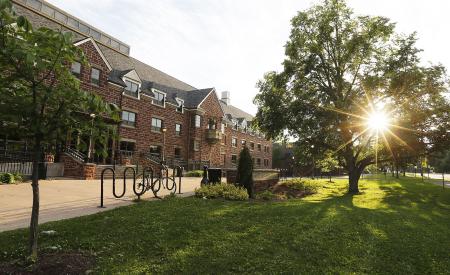Mount Allison biology researchers submit complete genome sequencing to national database
Mount Allison biology researcher Naaman Omar (‘20,’22) in the Campbell Phytoplankton Physiology Lab is submitting complete genome sequencing to the National Centre for Biotechnology Information (NCBI). Bacterial genome sequencing is the process of reading and understanding the genetic material of bacteria and comparing the sequence to that of a known reference.
“We strongly believe in open science, part of which involves making data publicly accessible. Submitting the genomes to public databases allows for reuse of the genomes for scientists working on other topics,” says Omar.
The bacteria they are currently working on were isolated from a lagoon system in the Baltic Sea by a former lab mate of Dr. Maximilian Berthold, adjunct professor in the biology department. They have been working together in the reconstruction of genomes and to find the reason bacteria respond in certain ways.
Their work is on cyanobacteria, which are a division of microorganisms related to bacteria but are capable of photosynthesis.
“Cyanobacteria are a type of phytoplankton. The strains we are working on will potentially increase their presence in future coastal waters and the ocean. Thanks to our approach, we were also able to sequence 17 bacteria, which may form a microbiome with our cyanobacteria,” says Omar. “Bacterial genome sequencing gives us a blueprint of the genetic material of the cyanobacteria that we are working on and allows us to predict pathways and reactions that they may be able to undergo.”
Omar graduated from Mount Allison in 2020 with a Bachelor of Science in honours biology and minors in chemistry and biochemistry and in 2022 with a Master of Science in chemistry.
For his MSc project, Omar collected data from publicly available databases, like the NCBI, to develop hypotheses on how different organisms respond to oxygenic stress.
Omar will attend the Stanford Research Institute (SRI) workshop for their genome curate-a-thon event to begin modelling their cellular and metabolic capacities to help understand why they are dominating new habitats.
The event will take place at the end of July, gathering scientists to curate the pathway and genome database on one of the most widely studied cyanobacteria. The goal is to have a team of 20 cyanobacterial researchers to manually curate the genome of a cyanobacteria called Synechocystis.
“It is beneficial to curate a genome, to validate that what we think the organism is capable of doing matches up with the literature.”




